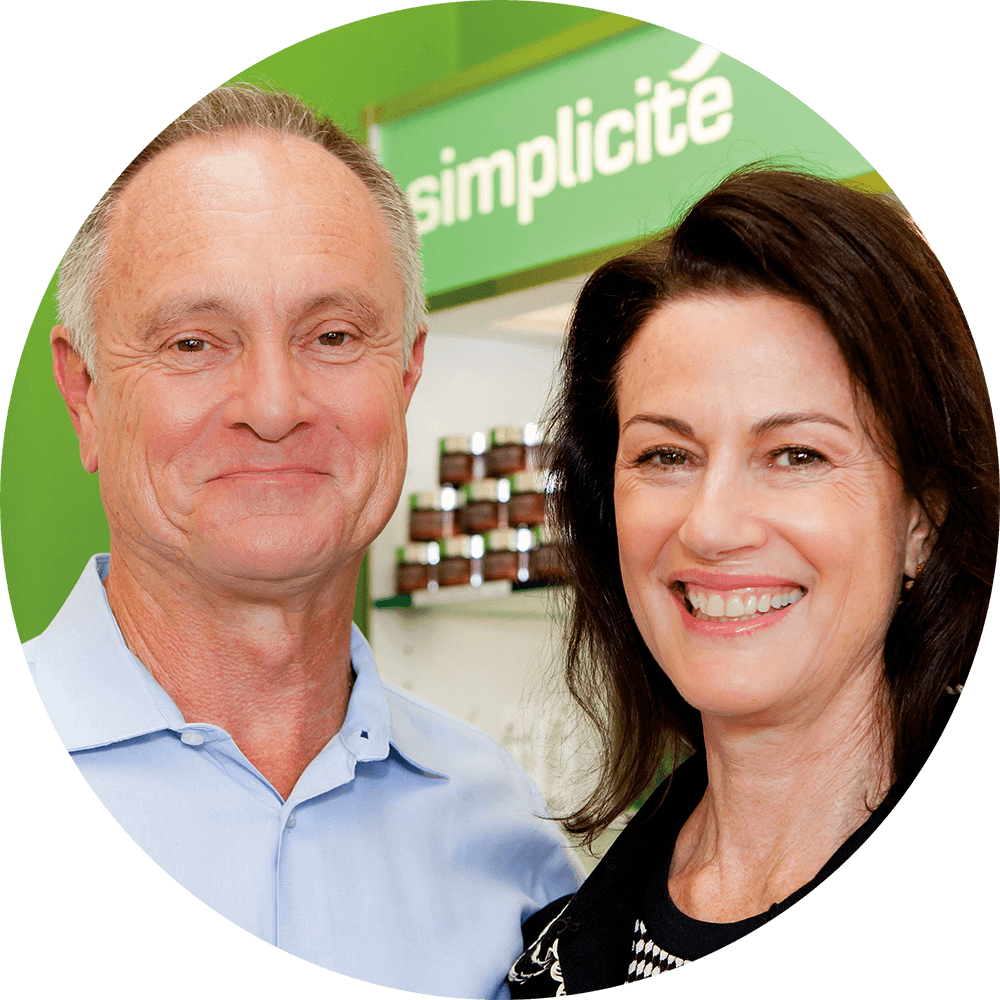Glycolic Acid has become a go-to anti-ageing skincare ingredient in recent years.
It’s often found in moisturisers and facial peels with labels that promise to brighten skin, fade hyperpigmentation, reverse sun damage and reduce wrinkles.
But you won’t find Glycolic Acid in the best natural skincare products and that’s because it’s a harsh ingredient without lasting benefits.
How harsh, you ask?
Glycolic Acid is an industrial chemical cleaner
Big industry loves Glycolic Acid because it rapidly dissolves the build-up of calcium carbonate and iron oxide scales on commercial machinery.
Think of the calcium build-up on the inside of your kettle but on an industrial scale.
But it’s in so many skin care ranges, it must be good for skin …
The leather industry would agree that it is good for skin.
They use Glycolic Acid for tanning and dyeing animal hides.
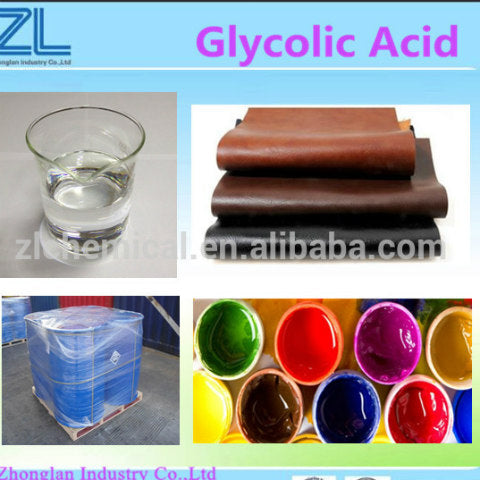
Chinese merchant site sells industrial strength Glycolic Acid
Glycolic Acid, with the chemical structure C2H4O3, has the smallest molecules of all Alpha Hydroxy Acids so it’s able to penetrate skin easily and deeply.
But what it does there is it weakens the skin’s cellular bonds, hence its popularity in the leather industry.
So although skin care users might find an initial improvement to their skin’s texture after using Glycolic Acid, the improvement isn’t lasting.
The economy of acid production
Worldwide, Glycolic Acid is produced on a massive scale. Several million kilograms are manufactured each year to meet the demand for its commercial applications.
Whether it’s for descaling an industrial vat or treating hyperpigmentation, one thing is certain: Glycolic Acid is produced using the cheapest methods possible.
Many skin care brands and articles claim Glycolic Acid is made from sugar cane.
While it is true that small amounts of Glycolic Acid can be isolated in some fruits, this is not a typical method of production due to the expense involved.
Typically, Glycolic Acid is made from formaldehyde, the same chemical that funeral homes and medical school laboratories use (in much greater concentrations) to preserve dead bodies.
The other acids used in skin care
Glycolic Acid is an Alpha Hydroxy Acid (AHA), a group of acids which includes Lactic Acid, another common skin care ingredient.
Then there are Salicylic Acid (a Beta Hydroxy Acid), Ascorbic Acid (synthesised vitamin C) and its derivatives, which include Ascorbyl Tetraisopalmitate and Ascorbyl Palmitate.
You'd think it would be hard to sell 'acid' as something to use on your skin, but somehow the marketing of AHAs and others acids makes them sound good enough to eat.
Commonly you will hear reassurances that Lactic Acid is found in milk, Salicylic Acid comes from the bark of a willow, and Ascorbic Acid from citrus fruit.
However the harsh reality is that Lactic Acid is produced in factories from chalk.
Salicylic Acid is extracted from the bark of willow trees. Then however, it is oxidised into concentrations nature wouldn’t recognise to become a medication used to remove the outer layer of skin eg it is the active ingredient in wart remover.
Similar to other hydroxy acids, salicylic acid is an ingredient in many skin care products.
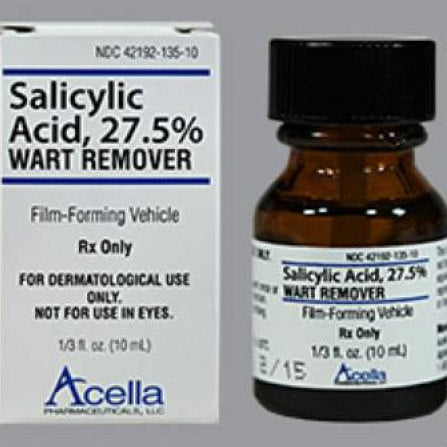
Wart remover's active ingredient is Salicylic Acid
Ascorbic Acid (synthesised Vitamin C) has nothing to do with oranges or any other citrus fruit.
Ascorbic Acid is made by fermenting glucose in pollution-pumping, chemical plants in China and India and then shipped world-wide as dried crystals in industrial sized drums.

Pollution-pumping chemical plants in China
Not a dairy nor an orchard in sight.
Meanwhile, industrial scientists are working all the time to improve the economic production of these acids, experimenting with bacteria closely related to E.coli, salmonella and a lesser known strain that causes diphtheria.
It’s literally sickening.
Glycolic Acid (and any acid's) effect on skin
The main thing Glycolic Acid does well is to weaken the binding properties of skin cells (hence its popularity in the leather industry, where hides are fashioned into products).
AHAs and acids in general can appear to produce a temporary improvement in the condition of skin or the reduction of fine lines.
But the long-term result is skin that appears to have lost elasticity.
Think of a bee sting or a green-ant bite.

A bee sting causes mild skin swelling
Each of these insects injects a small amount of formic acid under the skin, resulting in mild swelling. Similarly, AHAs and other acids cause a mild puffiness which appears to tighten the skin, but the effect does not last.
In fact, their application exposes users to other dangers.
AHAs, such as Glycolic Acid, and other synthetic acids can make some people’s skin extra sensitive to sunlight – by as much as 50% in some individuals. That's why you will often see warnings to wear sunscreen while using AHAs.
Doctors also warn of the side effects from using AHAs in moisturisers and peels. These can range from mild skin irritation to skin discolouration (hyperpigmentation) and severe burns.
Why Simplicité does not use Glycolic Acid (or any AHAs)
Simplicité products are designed to increase the bonds within the skin and to restore firmness and a youthful complexion. All this is achieved without using any harsh ingredients.
We use exfoliators and nutrient-rich compounds made from enzyme-active mixes of almonds, linseed and adzuki beans, or rosehip, cinnamon and birch extracts.
Simplicité rejects the use of Glycolic Acid and other AHAs due to the damaging effect it has on the skin.
It is an ethical stand we take at our own expense.
Glycolic Acid. for example, costs about $2.50 per kilogram. By contrast, the medicinal-grade plant ingredients Simplicité uses cost between $80 and $460 per kilogram and sometimes more.
Financially, it would make sense for us to use cheap ingredients, but ethically, our conscience won't allow us to use an industrial acid on human skin.
Rejuvenating alternatives to Glycolic Acid, AHAs
Luckily, our products are formulated to create a healthier, youthful complexion without harsh ingredients. Try some of the following for a lasting improvement:
- Rehydration Serum – apply under Face Oil
- Exfoliating Face Treatment – use 4 or 5 days per week
- One Step Exfoliating Cleanser – use every night or at least 5-6 times per week. This can be alternated with the Exfoliating Face Treatment if preferred.
- Rosehip and Lavender Complexion Refiner – use 2 or 3 times per week
- Plus. our range of nutritive moisturisers and deeply hydrating face oils are designed to suit your skin type.
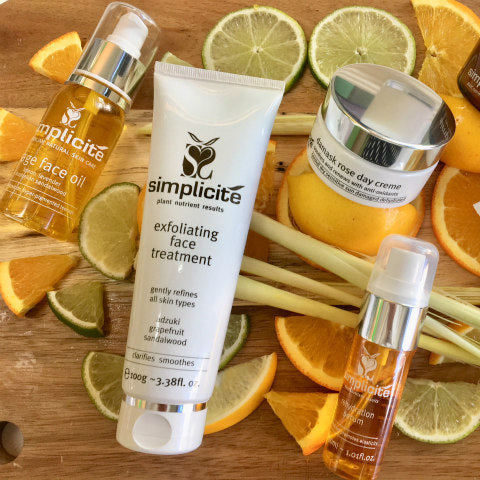
Some rejuvenating alternatives to Glycolic Acid
A better alternative to Ascorbic Acid
Compounds in premium quality citrus essential oils have been shown to have remarkable skin rejuvenation properties, including increased firmness and a reduction of pores and fine lines. And, naturally, they give a radiance to complexions.
If you are looking for an effective vitamin C serum with proven results, look no further than our Results Lift Gel. This contains the highest levels of real vitamin C extracted from organic dried rosehips (the fruit of the rose), plus anti-ageing retinoic acid extracted from rosehip seeds. These are powerful, active antioxidants.
Simplicité’s Lemon Night Creme contains medicinal-grade extracts from whole lemons, grapefruits, lemongrass, and sweet oranges. Our extracts are made by hand from whole plants. There is nothing lifeless, powdered, or commercial about our ingredients.
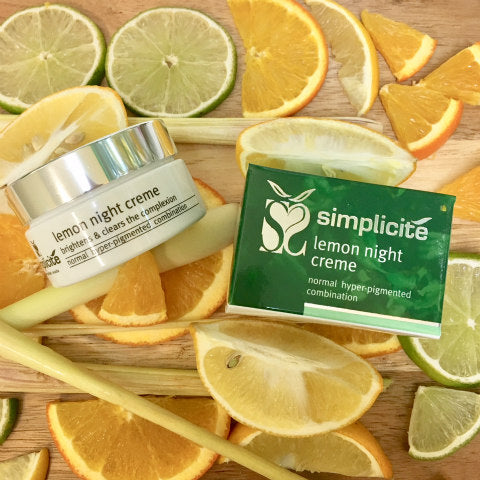
Lemon Night Creme
Our Lemon Myrtle Citral Terpenoid Firming Mask peels off to instantly improve skin texture and tone. It contains Australian lemon myrtle leaf, which is rich in citral compounds that reduce the effects of premature ageing due to sun damage. Lemon balm has anti-skin-cancer properties, Linden blossoms soothe skin irritations and inflammation.

